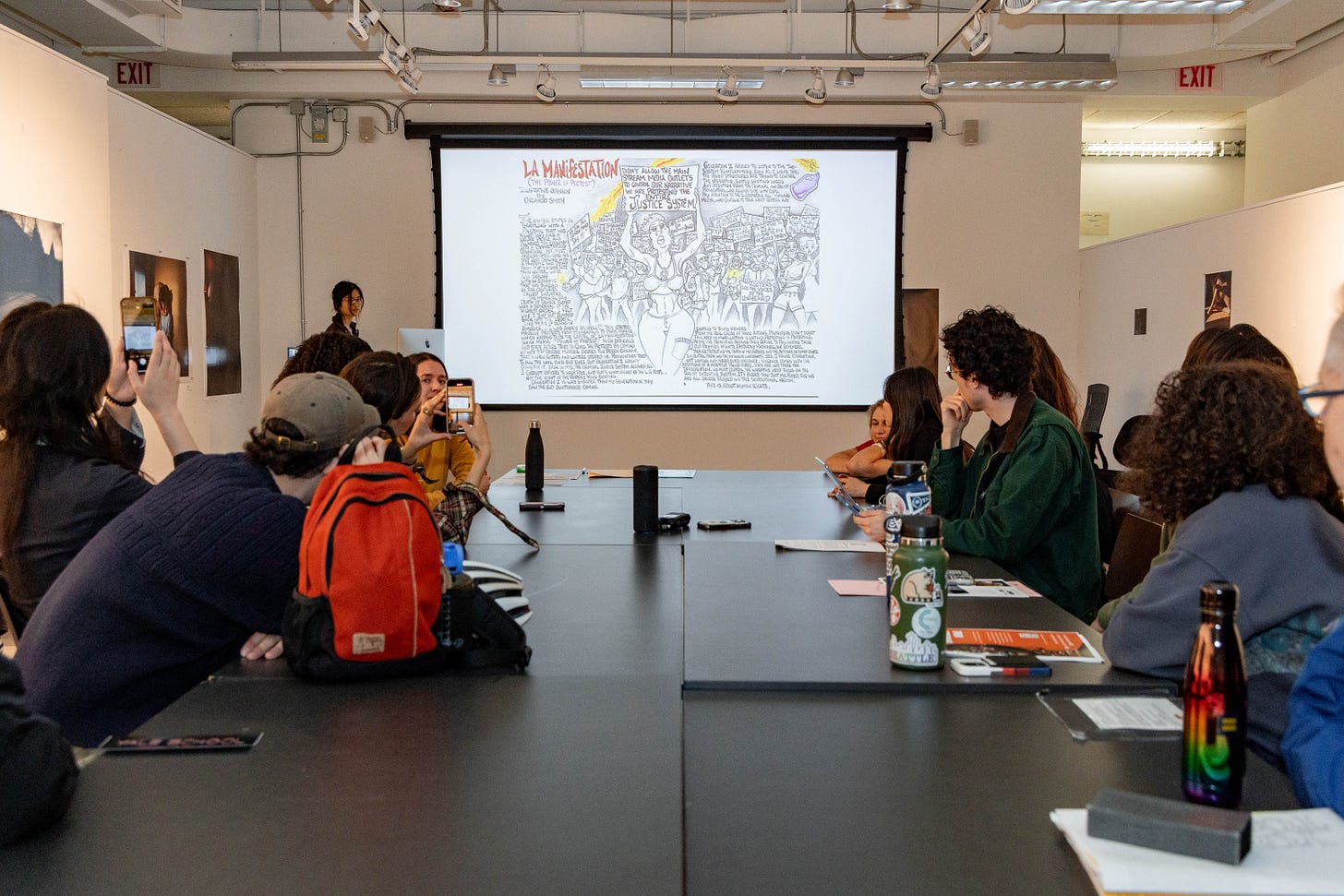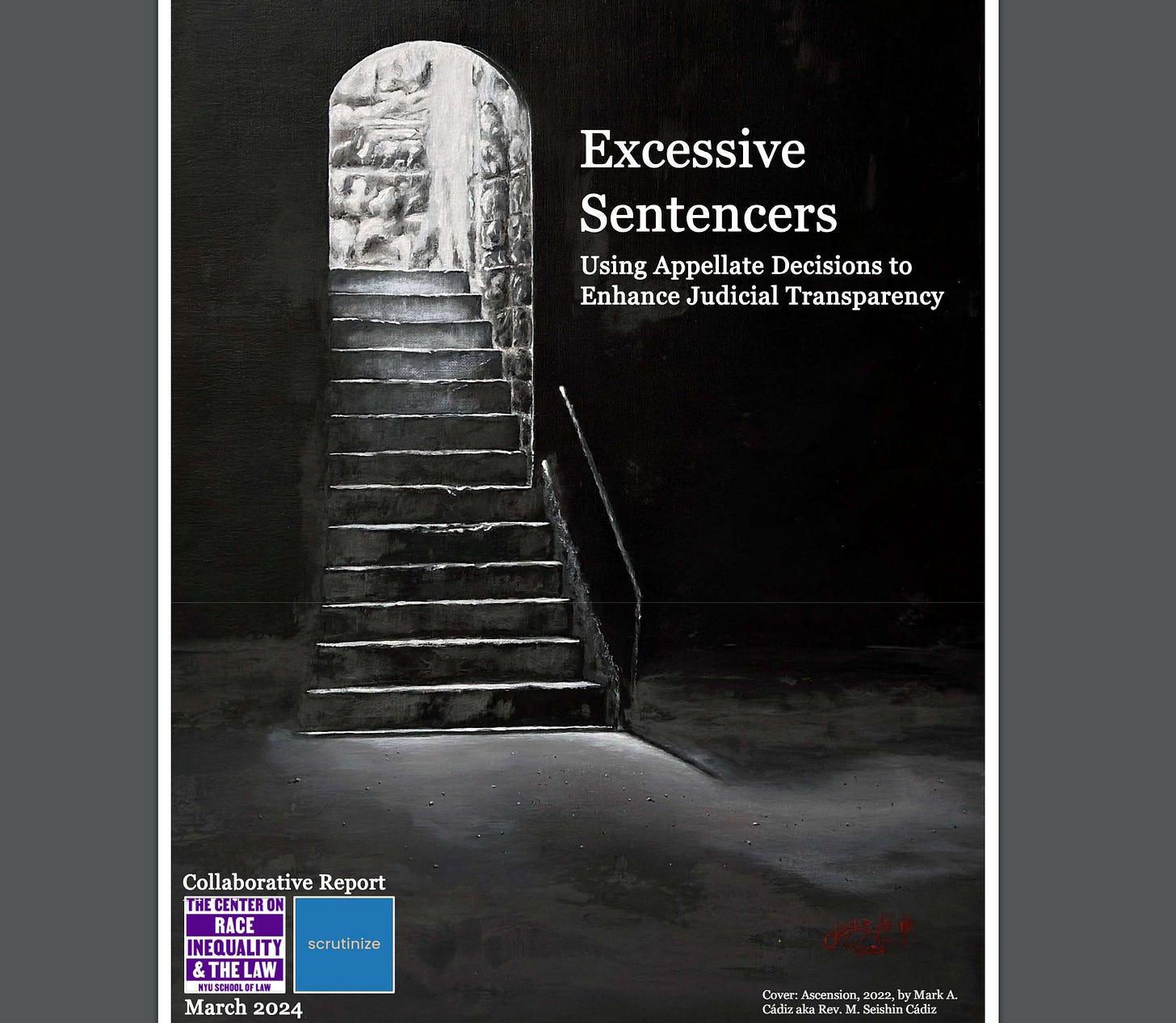Welcome to Empowerment Ave! Learn more about our history, partnerships, and past published work here. Subscribe to the newsletter here.
Hi community — so much happened this month from California to Connecticut we’ll just give highlights. On April 13th we hosted a Teach-In at Yale University (above) with our incredible student group — Miye Sugino, who serves as our Arts Advocacy Coordinator, Aerin Washington and Kelly Li. Thank you Kwaneta Harris, Tomiekia Johnson and O. Smith for calling in, sharing your wisdom and answering questions. Thanks to Yale School of Art for hosting us. On April 27th we wrapped Corey Devon Arthur’s Save the Flower exhibit at the Brooklyn Public Library with an info session hosted by Prison Library Support Network. And on April 28th we participated in the Antioch Urban Arts Festival to present the second installment of our three-part art installation series titled Work Assignments: Forced Prison Labor in the Land of the Free. Thank you to artists Alvin, Corey, Khalifah, Liz, Chantell, Cádiz, Orlando and Jeffrey for being a part of it!
Keep reading for reporting, essays, op-ed and more … plus a special artist spotlight.
Our Latest Work
Last summer, Kwaneta Harris wrote for Prism1 about the extreme heat from solitary confinement in Texas prisons. This month, she returned to write about what it's like to suffer in a solitary cell during extreme cold. And for Scalawag Magazine2, she wrote about Texas refusing to install life saving AC in prisons.
Kwaneta Harris’s byline also appeared in The Austin Chronicle3 attached to an op-ed about the unique needs and challenges of incarcerated women, and the importance of centering their experiences in advocacy work.
For Shado Mag4, Tony Cobb shared about the impact of the Felony Murder Rule on his life and incarceration. “Over the years the hole in the floor widened, and the foundations of this old house sank into the earth.”
For Filter Mag5, Tony Vick wrote twice about food this month. The first piece is about the recipes he uses to deescalate violence in prison, including microwave cabbage and prison fruit cake. “People lower their defenses when they’re eating,” he writes. His next piece is about the private prison industry changing what constitutes “food.”
Tony Vick also wrote for Filter Mag about how Tennessee private prisons quietly transfer residents, this time without saying why. “They’ve put me in a hellhole,” one former neighbor wrote to him.
Phillip Vance Smith made a debut in The Huffington Post6 for his story about prison overcrowding, understaffing, and the resulting uptick of violence: "I've Been Incarcerated For 22 Years — And I've Never Seen Prisons This Out Of Control.”
The first in a new series of Film Comment’s7 collab with us, Phillip Vance Smith wrote about how people in prison watch movies. “In prisons across the state, I have sat in groups to watch films on cable television, on DVD, and sometimes projected on a theater-size movie screen.”
Washington prisons used to be dead zones for legislative information and influence. But since 2020, Look2Justice has been training incarcerated people how to advocate for reforms that directly impact their lives. For The Appeal8, Antoine Davis and Christopher Blackwell report.
As part of our partnership with Spectre Journal9, here’s a story from Chanell Burnette about labor, care, and productivity inside a women's prison. “Every Tuesday, Thursday, and Saturday, the clock inside my prison cell dings at 2:10 a.m. and awakens me from a peaceful sleep.”
Sara Kielly's poem, Betrayed by Langston, is featured in Issue IX of The Spotlong Review10! This is a continuation of our partnership with the digital lit journal.
Good behavior no longer matters at Bedford Hills Correctional, wrote Sara Kielly for the New York Amsterdam News11. Her op-ed is about the abrupt end of the "Earned Housing Unit" and the impact it's had on the women incarcerated there.
Paris Whitfield published with Inquest12 this month with a story about the banality and pervasiveness of mandatory surcharges among NY's prison population. "One’s debt to society should not be a poor person’s tax cloaked as a mandatory court surcharge."
“Incarcerated at a facility in the Everglades, I spent years living in the shadow of Miami. Finally, I got to visit.” Ryan Moser wrote for Condé Nast Traveler Magazine13 about reacquainting himself with freedom in Miami.
For Solitary Watch’s Voices from Solitary14, Xandan Gulley shared diary entries about experiencing violence inside his prison without medical attention. “I was told that the officers involved could not be disciplined because the assault was not captured on camera. Once again, my own voice was ignored and silenced.”
Chris Blackwell headlines The Appeal’s May newsletter with After 20 Years in Prison, Jail Is Still A Different Kind of Hell. “I had to return to jail before a resentencing hearing. It meant taking a trip back through hell.”
Artist Spotlight
This month we’re highlighting artist Mark A. Cádiz, also known as Rev. M. Seishin Cádiz, and his painting Ascencion, which graces the cover of a report co-published by NYU School of Law, Center on Race Inequality & the Law and Scrutinze. Check it:
Here is Cádiz on his painting: “We all have experienced darkness and feelings of isolation, whether short or indeterminably long, that it overwhelm us. I have been there. However, there always exists a manner to move beyond that darkness to bask once again in the light of freedom, love, and hope.
Monochrome work can imbue an image with a particular climatic intensity to draw one’s attention and imagination in. The light at the top of this stone stairwell beckons us to rise up.”
Inside/Outside Insights
KUDOS: We are so proud of Heather Jarvis whose reentry journey was profiled by The Associated Press. Heather worked tirelessly to share her story, and reunite with her daughters, during incarceration. Now she's facing the unique reentry hurdles women face after leaving prison.
SUPPORT: ACLU of Michigan filed a lawsuit to demand the Michigan Department of Corrections release records of its retaliatory acts against Demetrius Buckley, a writer we support. The suit has been filed on behalf of EA volunteer/journalist Dan Moritz-Rabson. Read more about it here.
FRIENDS: Our Interrupting Criminalization Abolition Journalism comrade Kermit Williams has a piece up in Mainline Zine about serving life without parole within Virginia's broken system. And our Press in Prison comrade Lyle C. May just published a book, Witness: An Insiders Narrative of the Carceral State, with Haymarket!
Want to connect with us more?
Follow us on Twitter and Instagram | Donate to our work here | Learn more on our website here | Build with us at empowermentave@gmail.com
Through in-depth and thought-provoking journalism, Prism reflects the lived experiences of people most impacted by injustice. They pay 50 cents per word.
Scalawag is an American nonprofit digital magazine focused on Southern politics and culture. They’ve paid between $500-800 for essays.
The Austin Chronicle is an independent, locally owned and operated alternative newsweekly that reflects the heart and soul of Austin, Texas. They do not pay for op-eds.
shado is a multimedia platform driving change at the intersection of arts, activism and academia. shado stands for See. Hear. Act. Do. They pay about $90 for essays.
Filter’s mission is to advocate through journalism for rational and compassionate approaches to drug use, drug policy, and human rights. They pay $300 per essay.
The Huffington Post is an American progressive news website, with localized and international editions. They pay $150 for personal essays.
Film Comment is the official publication of Film at Lincoln Center. It features reviews and analysis of mainstream, art-house, and avant-garde filmmaking from around the world. They pay $300 for essays.
The Appeal is a nonprofit news organization dedicated to exposing how the U.S. criminal legal system fails to keep people safe and perpetuates harm. They pay $1 per word.
Spectre Journal is a new Marxist journal that understands anti-oppression struggles as constitutive of class struggle. They’re paying $50 per essay.
The Spotlong Review is a literary and arts journal committed to publishing exceptional writing and visual art from artists of all backgrounds. They do not pay.
The Amsterdam News is a weekly Black-owned newspaper serving New York City. It is one of the oldest newspapers geared toward African Americans in the United States. They do not pay for op-eds.
Inquest is a decarceral forum powered by voices dedicated to eradicating mass incarceration in its many forms. They pay $250 for essays.
Condé Nast Traveler is a luxury and lifestyle travel magazine published by Condé Nast. The magazine has won 25 National Magazine Awards.
Solitary Watch is a premier source of news and information on solitary confinement in U.S. prisons and jails. They pay $250 for their Voices from Solitary section.





Thank you for amplifying the voices of those incarcerated inside of the American prison system.